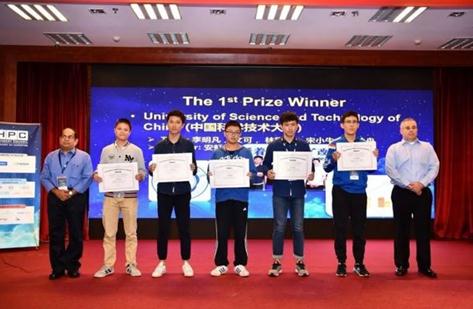On October 18th, the annual HPC Seminar, hosted by the HPC Advisory Council, was held in Hefei. At the seminar, the HPC Advisory Council officially announced the results of the 5th Student RDMA Programming Competition (Hereafter be referred to as the competition or the RDMA competition). The SwanGeese team (超算鸿雁队) from University of Science and Technology of China (hereafter be referred to as USTC) and another team from Shanghai Jiao Tong University stood out from more than 60 teams, both of which won the First Prize. And the team from the National University of Defense Technology won the first Special Award in the history of this competition.

Five years after the first competition, the influence of it has spread further and further, attracting more than 60 teams from colleges all over the world, drawing attention from many world-top experts on High Performance Computing, Cloud Computing and Big Data, and becoming a hot topic to the media.
With the rapid development of artificial intelligence, the focus of industry turns to boosting AI with High Performance Computing. In the AI era, RDMA (Remote Direct Memory Access) is the most efficient networking protocol to break the bottleneck of data transmission. Whether for the traditional high-performance computing applications or for the emerging Deep Learning frameworks, RDMA acts as one of key technologies. As thus, the topic of this year catches up with the latest development of the world's super-computer industry, focusing not only on the theoretical framework and the practical model, but also on the trend in development of artificial intelligence and deep learning, which advocates the idea of combining the competition and concrete applications.
This competition has become an important platform from which the RDMA related professionals are trained and elected. At the seminar, architects from Alibaba, Jingdong, IFLYTEK, SenseTime, Face++, etc. participated in the discussion on RDMA and AI, and showed eagerness for RDMA professionals. The competition has received strong support from a number of well-known institutions at home and abroad, including the San Diego Supercomputer Center, the Argonne National Laboratory, CCF TCHPC, ChinaGrid, etc. The judges are composed of senior experts abroad and professionals from leading Deep Learning industries including: Alibaba, Jingdong, IFLYTEK, SenseTime, Face++, Mellanox and NVIDIA. Gilad Shainer, the HPC Advisory Council Chairman, was also the chairman of the judging committee.
Since the first one, the SwanGeese team of USTC has participated every year, and have won three First Prizes and two Second Prizes. Each year the SwanGeese team mainly consisted of grade-2 and grade-3 bachelor students, along with 1 or 2 novice master students. In the competition, the members improve their research capabilities, the understanding and the mastery of new technologies. The team for this year consists of two novice master students: Li Mingfan and Wen Ke, and three bachelor students of grade-3: Lin Zhiqi, Chen Yongzhou and Song Xiaoniu. The team is instructed by Prof. An Hong from the School of Compute Science and Technology. Those five students was striving the whole summer vacation, studying from the ABC of RDMA technology to the migration onto MXNet. They made continuous breakthroughs in porting and optimizing RDMA on MXNet, and finally improved the performance of the networking module by nearly 22 times, thus indirectly improved the performance of the whole system by 5 and 9 times against two test cases. The RDMA Programming Competition provides a platform for students to communicate with each other, giving them the opportunity to catch up the latest of technology and to compete share with teams from top universities around the world, and to develop insight and innovation.

